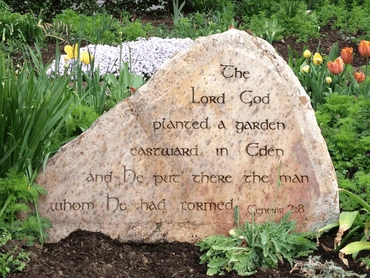Explanation of Genesis 2:17
By Brian David

There is, for everyone, a crossroads when it comes to spiritual things, a basic decision to be made. Are you going to believe in the Lord and in spiritual reality? Or are you only going to believe what you can see, touch, feel and otherwise "know" from your own mind? The Writings say those who choose the latter course are closing themselves off from the truth, because by definition spiritual reality cannot be seen, touched, felt or otherwise "known" through purely human means. That's what it means to eat "of the tree of the knowledge of good and evil," and it leads to spiritual death – which is being cut off from the goodness and truth the Lord wishes to bestow on us.
The people of the Most Ancient Church were in a state of love to the Lord, and had been invited to gather all the wisdom and knowledge flowing from that love – the fruit of all the other trees. But they had to accept the Lord as the source, had to accept that He existed, had to accept that He was infinite and beyond their finite understanding. To think otherwise – to think that through their own minds they could explain the Lord – would be to put themselves above him, and lead them into evil.
It's worth noting that this was not a call for people to shut down their minds. The fruit of the other trees represents an incredible bounty of exploration, learning and wonderment. And we're not called on to shut down our minds today; the Lord gave us our intellectual faculties for a reason. To let the Lord in, though, we have to accept the unprove-able idea that He is love itself and reality itself, and see all other knowledge in that light.
(References: Arcana Coelestia 126-132, 127, 128-134, 129, 0130)
Arcana Coelestia #8146
8146. 'And he harnessed his chariot' means doctrine championing falsity that belongs to separated faith in general. This is clear from the meaning of 'chariot' as doctrine, dealt with in 2760, 5321, 5945, in this case doctrine championing falsity that belongs to separated faith, since the chariot is Pharaoh's and 'Pharaoh' represents the falsities that belong to separated faith. For those who subscribe to faith separated from charity and at the same time lead a life of evil are inevitably steeped in falsities, 8094.
[2] The descriptions that follow on from here refer to the gathering together of all the falsities arising from evil that existed with people who subscribed to faith separated from charity and led a life of evil. Descriptions prior to this have dealt with the vastation of the truths of faith that exist with those people, and with the eventual reduction of those people to a condition which is such that they are steeped in utter falsities arising from evil, and so are lost in damnation. The present chapter now deals with their being cast down into hell, for being cast down into hell follows damnation. What happens in this state - a state in which people are cast down into hell - is as follows: When they are going to be cast down all the falsities that exist with them are first gathered together (which is accomplished by the opening up of all the hells with which they have had contact) and then are poured into them. As a result those people have around them dense masses of falsities arising from evil, which appear as waters to those looking on from outside, 8137, 8138; they are vapours emanating from their life. When they are engulfed by those dense masses they are in hell. When the falsities arising from evil are gathered into one and poured into them the purpose is that those people may become surrounded by the kinds of things that have come to be part of their life, and after that may be confined within them. The type of evil, together with the falsity arising from it, then mark them and their hell off from other hells.
[3] Because of the subject here - the gathering together of all the falsities arising from evil that existed with those people - references are made so many times in this chapter to Pharaoh's chariot, his horses, horsemen, army, and people; for these mean all the powers of falsity that reside with those people. Such references are,
He harnessed his chariot, and took his people with him. Verse 6.
He took six hundred chosen chariots, and all the chariots of Egypt. Verse 7.
And the Egyptians pursued them, all Pharaoh's chariot-horses, and his horsemen, and his army. Verse 9.
I will be glorified in Pharaoh, and in all his army, in his chariots, and in his horsemen. Verse 17, and similarly verse 18.
And the Egyptians pursued, and came after them, all Pharaoh's horses, his chariots, and his horsemen. Verse 23.
Jehovah took off the wheels of their chariots. Verse 25.
Let the waters return onto the Egyptians, onto their chariots, and onto their horsemen. Verse 26.
The waters returned and covered the chariots and the horsemen, even all Pharaoh's army. Verse 28.
These references to them occur so many times because falsities arising from evil - their being gathered together and poured into those people - are the subject. The things referred to so many times mean all the powers of falsity arising from evil. 'Pharaoh' and 'the Egyptians' are the people themselves who are steeped in falsities arising from evil; 'the chariots' are doctrinal teachings that uphold falsity; 'the horses' are false factual knowledge belonging to a perverted understanding; 'the horsemen' are reasonings resting on that knowledge; and 'the army' and 'the people' are the falsities themselves.






